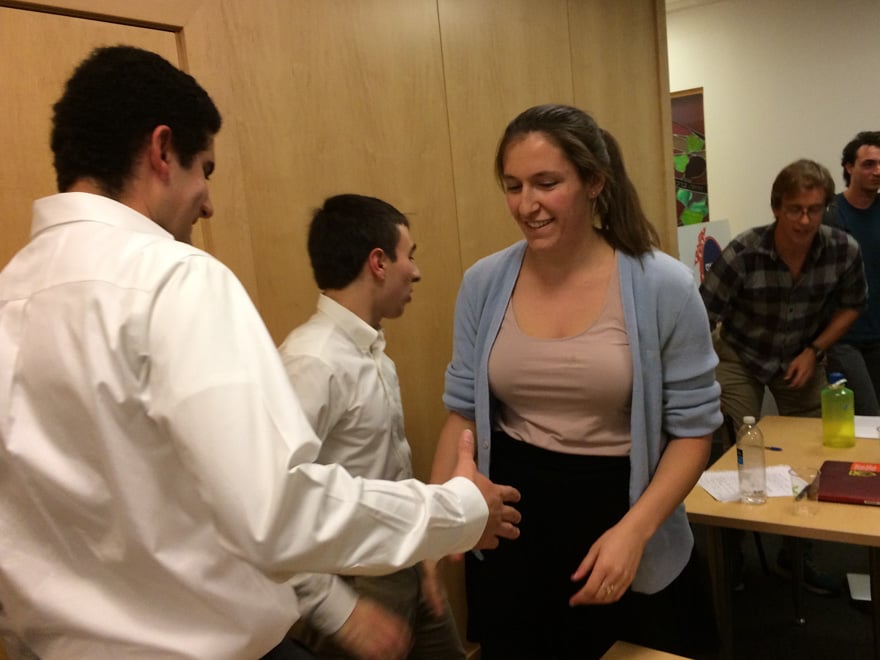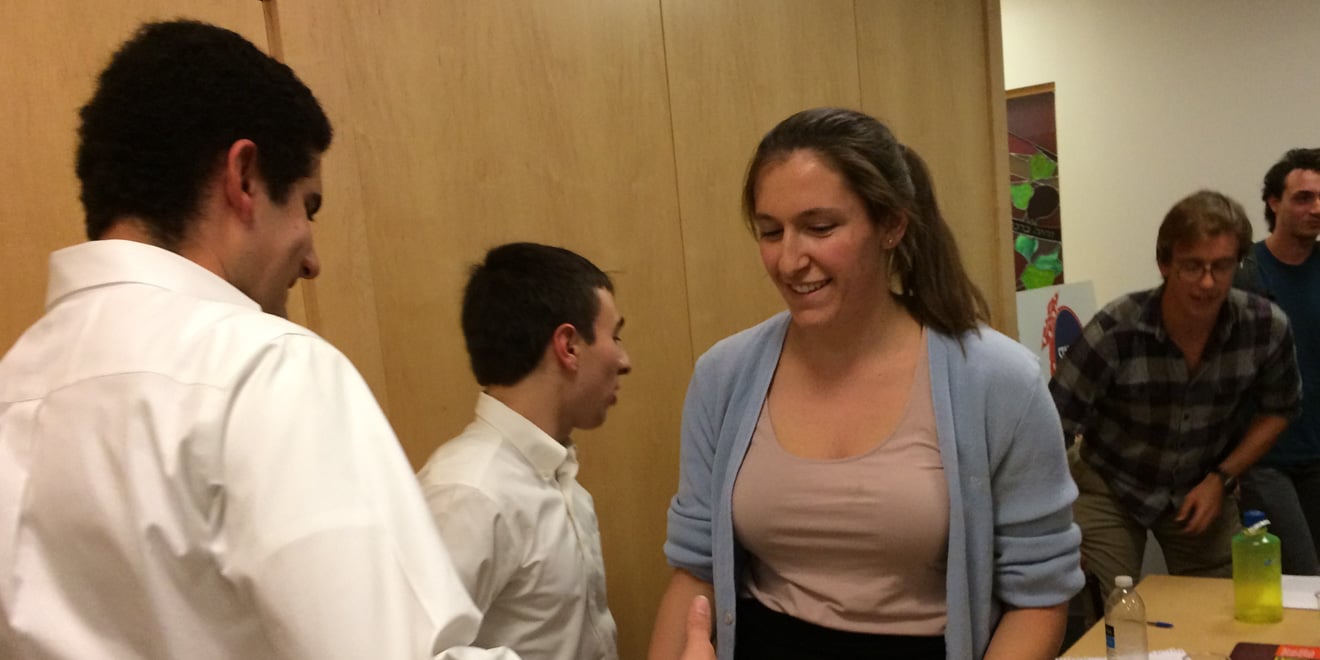On Wednesday evening, Stanford in Government (SIG) hosted its first Stanford Student Debate Night on the topic of fossil fuel divestment. Representatives from the Stanford College Republicans (SCR) and Fossil Free Stanford (FFS) debated for nearly an hour before answering questions from an audience of over 200.
Stanford College Republicans was represented by John Rice-Cameron ’20 and Ben Esposito ’21, while Fossil Free Stanford was represented by Rebecca Behrens ’19 and Justin Wilck ’20.
Pre-debate expectations
For SIG, the event presented the opportunity to spark honest and productive conversations about an important issue among Stanford students. For SCR and FFS, the event provided a public space to speak about a policy they felt strongly about, as well as to engage with opposing perspectives.
Michael Swerdlow ’20 and Bryce Tuttle ’20, both members of SIG’s Public Policy Forum committee, were in charge of planning the event.
“We wanted to get people talking about some complicated issues, issues where there’s not just two sides but a lot of sides,” Swerdlow said.
At the same time, Swerdlow and the other Public Policy Forum committee members were aware of the ways that this type conversation could go awry and took steps to ensure the debate was constructive and respectful.
“We want to make it a place where everyone is assuming good intent on the other side,” Swerdlow said. “We’re going to set some other ground rules about respect: No ad-hominem attacks, no claiming moral superiority. We want this to be a real debate about the issues and respectful back-and-forth, not something that dissolves into a shouting match.”
In spite of SIG’s intent, the students representing FFS were initially apprehensive.
“One of my holdups going in [was] that I was really worried that if you are debating in a public setting, you somehow start debating on climate science,” said Behrens. “We’re not here to do that.”
On the other hand, Rice-Cameron of SCR had no qualms about the event.
“I don’t know if there’s anything to really be scared of,” he said.
Both debate teams did express a desire to use the event to share their points of view with a wider audience.
“I see this debate as a really good way to bring in more of the campus – especially since a lot of the work that we do [in FFS] is in more environmental circles – and just reach people we might not otherwise have a conversation with,” said Behrens.
According to Rice-Cameron, SCR’s goal for the conversation was to present “the conservative angle on issues around energy and fossil fuel divestment.”
“Our plan [was] to stay on message, talk about why a free market-based approach is the most viable solution to our energy … situation and why fossil fuels are actually part of the solution to reducing emissions and to creating a more balanced and sustainable energy future for the United States,” he said.

Parties in conversation
After brief statements by some of the co-sponsors, Swerdlow opened the debate by reiterating the importance of fact-based dialogue, avoiding ad-hominem attacks and assuming good intentions by the other side.
“Please keep an open mind,” Swerdlow said. “Ask yourself the question: What set of facts would lead you to change your opinion on this issue, and what would you need to hear to be persuaded those facts are true?”
Wilck opened for FFS with a working definition of fossil fuel divestment as “a decision to remove funding and support from fossil fuel companies unless companies publicly commit to the following three criteria: … only to burn 20 percent or less of their current reserves … to stop seeking new fossil fuel reserves … [and] to stop actively lobbying against national legislation and international agreements that would limit GHG [greenhouse gas] emissions.”
“For us, the scope and severity of climate change merits institutional action,” explained Behrens.
She said that because the impacts of climate change disproportionately harm those communities which are least to blame for the crisis – and because the corporations responsible have actively impeded efforts for environmental protection – Stanford has a moral obligation to use its investment portfolio to push for change.
In response, Rice-Cameron noted that in 2016, Stanford’s Board of Trustees chose not to pursue fossil fuel divestment because it “could not evaluate whether the social injury caused by the fossil fuel industry outweighs the social benefit it provides.” He also said that renewable energy alternatives are “simply not viable alternatives at this time.”
“The ideology of divestment demands the elimination of fossil fuels,” Rice-Cameron continued. “Eliminating and undermining fossil fuels amounts to what would essentially be a decapitation of the world economy.”
The result, he suggested, would be a reversion to the world of 1850.
“If our goal is to reduce emissions, the only proven means of doing so is through innovations in current fossil fuel technologies and harnessing the power of the free market that makes innovation possible,” Rice-Cameron concluded.
The two sides then entered a cycle of statements and cross-examinations.
“Divestment is not about the fact that we can be at zero emissions today. It’s about the fact that we want to be there by 2050,” Behrens noted in response to SCR’s opening statement. “And fossil fuel companies are a roadblock to getting there by perpetuating climate denialism, by spreading misinformation and by continuing to block climate policies.”
Investment therein perpetuates that problem, Wilck added, by “approving and condoning” those corporate actions. And while green energy sources might be expensive now, that’s because they’re under-invested in, she said. Turning away from fossil fuels would make the alternatives more tenable.
SCR was skeptical that those green options would be reliable across the country, such as in places like the northeastern United States.
But, responded Behrens, she lives in the northeast – and her house is solar-powered. With interconnected energy grids and better batteries, she explained, green energy is a viable option.
“People care about their pocketbooks first, and renewables are way too expensive for people to switch,” Esposito countered.
Although fossil fuels have “very real consequences,” he continued, the electricity and fuel that enables modern life depends on them. To “demonize fossil fuels” is to ignore the central role they play in keeping the light on at Stanford and elsewhere, he said.
This was a mischaracterization of what FFS means when they call for divestment, Behrens countered, arguing that the intent is to pressure policymakers, not individuals, and that the FFS is not pushing for universal divestment – companies that meet their aforementioned three standards would be excluded.
“What is feasible is to use our voices to vote, to divest, to make social movements happen so we can live in a world that, structurally, is easier to make those decisions in,” Behrens said.
The idea of direct intervention in the economy troubled SCR’s members. After all, they asked, wasn’t it free market’s innovation that led to the development of fracking, which has led to lower natural gas prices and, according to the International Energy Agency, contributed to a two percent decline in carbon emissions?
“Fossil fuels are, in fact, part of the solution,” Esposito said.
What more, he continued, prohibiting certain investments might hurt Stanford’s economic well-being, and politicizing the University’s asset portfolio is wrong in its own right.
FFS, however, was skeptical about that claim.
“They actually did a study at Stanford … [that] analyzed [Stanford’s SEC] filings from 2012 to 2015,” Behrens said. “And they found that if they’d divested from oil and gas alone in that time, it would’ve made them half a million more dollars.”
Divestment isn’t enough on its own – both sides agreed on that much. But FFS sees that as a call to do more, while SCR sees it as a sign that the campaign is moot.
In closing, FFS reiterated its reframing of investment itself as a political act, as much as divestment. And, they said, to continue the former would be a tacit approval of the current state of environmental degradation.
“What divestment is, is an acknowledgement that our moral standards as they exist as an institution and as is widely supported by the student body, conflict with the actions and the moral standard set by the fossil fuel industry,” Wilck stated.
SCR concluded by noting that fossil fuel investments were a small part of Stanford’s much larger and generally positive impact on the world, and that divestment was more empty symbolism than anything else.
“We do not believe that oil and gas will continue to exist in 200 years, 100 years,” Esposito said. “However, today and for the future, we need fossil fuels, and an investment in fossil fuels.”
Aftermath
Following the debate and an audience Q&A, all sides seemed happy with how it had turned out.
“I think it went great,” Rice-Cameron said. “I think it was a great exchange of ideas and visions for [the] future of energy at Stanford, and around the world, and in this country.”
Although Wilck had some complaints about the structure of the debate itself, he “was glad that it remained fact-based, by and large.”
The organizers were also pleased.
“I’m super proud of the event we put on tonight,” Swerdlow said. “I think we got two sides to come together and really engage on a topic substantively.”
Contact Andrea Villa at acvilla ‘at stanford.edu and Brian Contreras at brianc42 ‘at’ stanford.edu.
